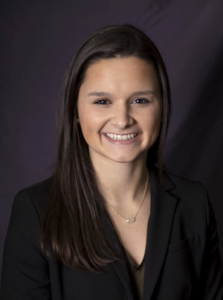Genetic counseling trainee Gianna Petrelli co-founds national platform for antiracist education
by Emma Mattson

How does a 90-percent-white profession* meaningfully engage with antiracist movements in medicine?
In the case of genetic counseling, it looks like GCRJ.
The brainchild of genetic counseling trainees Gianna Petrelli and Maia Borensztein, the Genetic Counseling Trainee Platform for Racial Justice (that’s GCRJ, for short) offers a brave space for trainees on the path of antiracist self-education.
As of mid-September, GCRJ includes over 260 members from across the United States. Together, its six committees are compiling antiracist materials, leading journal clubs, and optimizing their platform’s accessibility to all users.
Only five months ago, none of this would have been imaginable.
It all started with a tweet
GCRJ co-founder Gianna Petrelli is currently in her second year at Vanderbilt’s Master of Genetic Counseling program. Like many genetic counselors and trainees, Petrelli has used Twitter to ask questions and share resources within her field.
This spring, following the murders of George Floyd and Breonna Taylor, the conversation on GC Twitter turned to antiracism and racial justice. A central question gradually emerged:
How can genetic counselors work to create a safer space for Black patients, colleagues, and peers?
Petrelli herself tweeted a version of this question in early March and received several responses— including a retweet from Maia Borensztein, then a genetic counseling trainee at Stanford. Over Twitter direct messages and eventually through Zoom, the two trainees struck up a conversation about cultural competency and antiracism within their field.
“And what came out of that was: You know what, we’re two students, and there are so many of our peers out there that I’m sure would be ready to talk further about this,” Petrelli said. “So why don’t we see if there would be interest in creating some sort of group or organization that’s focused on antiracism as it pertains to genetic counseling?”
That’s exactly what Petrelli and Borensztein did.
In March, they tweeted out a form to gauge interest in a GC platform focused on racial justice. After receiving over 250 responses, the two hosted focus groups over Zoom and formed a committee of students interested in joining the leadership team.
Over the next two months, the committee drafted a mission statement, compiled antiracist resources, and formed six sub-committees— all in preparation for GCRJ’s launch on September 1.
The brave space, up and running
Within two weeks of the launch, more than 250 genetic counseling trainees had accepted the invitation to join GCRJ.
The platform now spans seven committees—mission, outreach, activism, education, research, resource curation, and Slack communication—each with a unique but crucial emphasis to GCRJ’s mission as a whole. Take, for example, the resource curation committee, whose stated mission is to “regularly curate a variety of resources on racial justice to be available for the community to learn and share.”
The committees are anything but static. In fact, members are welcome to suggest ideas, garner interest, and create new ones as needed.
Right now, GCRJ is focused on cultivating engagement. Some initiatives, like monthly journal clubs, feature synchronous discussion for trainees across the country. Others, like the recently released “Antiracism Glossary” and “History of Racism in the Genetic Counseling Field,” offer resources to help trainees pursue self-education and reflection on their own time.
This focus on self-education is one reason GCRJ chose to define their platform as a brave space, rather than a safe one.
“What safe spaces also can imply sometimes is that anything that you say is acceptable,” Petrelli said. “And in the space of antiracism, that certainly is not the case.”
Instead, a brave space encourages participants to courageously speak and learn together.
“If I do say something that has biased or racist undertones, then I need to understand that that will be addressed in this space,” Petrelli said, “because addressing that is ultimately what will lead to the safest space for our Black patients and our Black colleagues in genetic counseling.”
The GCRJ committee holds itself accountable to the same standard.
“Because of the demographic of the profession and of the people who helped create GCRJ and other trainees as well, we need to be continuously checking ourselves and making sure that white voices aren’t the ones centered,” Petrelli said.
In fact, when people outside GCRJ reach out asking to speak with the leadership, Petrelli directs them to the most relevant committee, rather than any one leader. While Petrelli and Borensztein were the two founders, they’re not the group’s presidents. In fact, GCRJ doesn’t have a president.
“The quote-unquote leadership that we have is just people who said, ‘We’ll do the logistic work here,’” Petrelli said. “We really want to focus on having a community-led environment, where if there is pushback, it’s addressed and taken very seriously.”
Learn more about GCRJ on Twitter at @GCRJTweets or by emailing gcrjteam@gmail.com.
*National Society of Genetic Counselors Professional Status Survey Report
